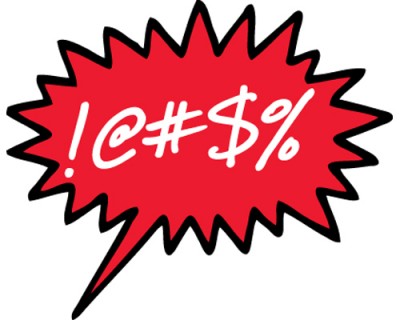Lawyer suspended 120 days for using F-word picked up on microphone in court, her 7th sanction

Shutterstock.com.
A Connecticut judge has suspended a Bridgeport lawyer from law practice for 120 days after concluding her F-word comment, picked up on a forgotten microphone worn during a deposition, confirmed that her repeated objections and disruptions were intentional.
It was the seventh time the court sanctioned lawyer Madonna Sacco for deposition conduct during a period of more than 20 years, according to Judge Thomas Moukawsher, who wrote the Sept. 20 opinion. The Connecticut Law Tribune and the Legal Profession Blog covered the sanction.
Moukawsher said the comment may have been directed at the judge or at opposing counsel. “F— him,” Sacco told an associate. “I am going to give him such a f—ing hard time.” The deposition was being held before the judge after an earlier deposition ended in disagreements.
“It may be the case with attorney Sacco that a single comment can sum up a career,” wrote Moukawsher, who presides in complex litigation cases. “The comment at issue here—made by attorney Sacco after some 30 years of practice—is as revealing as it is unacceptable.”
Sacco had claimed the comment was just ordinary lawyer talk. Moukawsher disagreed. “When wicked words betoken wicked deeds they are a matter for action,” he wrote. The words reflected what Sacco was doing and had been doing: willfully disrupting depositions, in the current case and in past cases that led to the prior sanctions, Moukawsher said.
Moukawsher summarized the conduct in the present case. Sacco had shown up late for an Oct. 31 hearing to resolve a deposition dispute, then “repeatedly interrupted the court and disputed petty things like whose copy of the deposition transcript should be read,” Moukawsher said
Sacco “rigidly insisted that it was perfectly proper for an expert witness at a deposition to refuse to consider hypothetical questions,” Moukawsher said. She squabbled over the opposing lawyer’s facial expressions and lectured the court. After a warning, Sacco “turned to physical antics, with her hands on her hips striking a defiant pose, head down shaking her head at length displaying disgusting disagreement while the court spoke,” Moukawsher said.
According to Moukawsher, Sacco went on to misrepresent the deposition record, saying that the expert witness had resisted assumptions but had not refused a hypothetical. The judge asked Sacco to find this assertion in the transcript, leading to “a lengthy attempt to bicker with the court and divert it away from the topic.” The transcript revealed that Sacco had made up the testimony she relied on, according to Moukawsher.
“It may be the case with attorney Sacco that a single comment can sum up a career. The comment at issue here—made by attorney Sacco after some 30 years of practice—is as revealing as it is unacceptable.”
Judge Thomas Moukawsher of Connecticut
The judge had admonished Sacco about her conduct five times during the hearing and concluded that the next deposition would occur in court. At the next deposition, on Nov. 29, Sacco lectured opposing counsel on the position of his microphone, refused to accept a court ruling that she could not sit in the witness box next to her witness, and continued “bickering and sniping at the court,” Moukawsher said. She interrupted virtually every exchange with objections, refused to sit down when asked and then ordered to do so, the judge said.
The deposition ended after additional warnings and a motion for sanctions by the opposing counsel that included Sacco’s F-word statements. Sacco’s client fired her and got a new lawyer.
At the sanctions hearing, Sacco’s lawyer had claimed the F-word remark couldn’t be considered because it wasn’t on the official transcript and it was attorney work product. Moukawsher rejected those claims.
The remark is important because it reveals a plan to disrupt a court proceeding, not because it does or doesn’t appear on the record, Moukawsher said. And attorney work product applies only when there is an attempt to keep the information confidential. A reasonable lawyer would take steps to mute a microphone to prevent inadvertent disclosure of work product, Moukawsher said.
And while the plan to give the court or a lawyer a hard time might be an expression of strategy, “it is hardly the kind of strategy this court should protect,” Moukawsher said.
Sacco had received five prior monetary sanctions and a sixth sanction of monitoring by another lawyer for one year. Moukawsher concluded that suspension was required “after 20 years of failed efforts” to deter Sacco’s deposition misconduct.
During that time, Sacco “fought with opposing counsel, interrupted their questions, peppered depositions with objections designed primarily to disrupt them, raised frivolous claims about testimony and now she has done the same thing in front of the court,” Moukawsher said. “There can hardly be a clearer case of a party who knows what not to do but has done it anyway.”
Moukawsher said he would consider reducing the 120-day suspension to 90 days after receiving satisfactory evidence that Sacco has received at least 20 hours of suitable counseling. She was also ordered to pay “the costs she has forced on the parties to these proceedings.”
Sacco is a partner with Heidell Pittoni Murphy & Bach, according to the Connecticut Law Journal. She is not listed as a lawyer on the firm’s website. The law firm issued this statement to the ABA Journal: “We cannot comment on the recent decision, but we are committed to ensuring that all attorneys in our firm adhere to the strictest professional standards.”
The law firm did not respond to a question about whether Sacco was still working at the firm. The ABA Journal also asked the firm to forward a request for comment to Sacco, but did not get a response.
See also:
ABAJournal.com: “Judge Sanctions Lawyer $11.5K for Coaching Witness at Deposition”
Recasts headline at 7:44 a.m.



